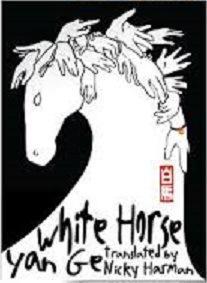
White Horse
Hope Road Publishing, RRP £1.19, Suitable for ages 12-16
Publishers blurb:
“Yun Yun lives in a small West China town with her widowed father, and an uncle, aunt and older cousin who live nearby. One day, her once-secure world begins to fall apart. Through her eyes, we observe her cousin, Zhang Qing, keen to dive into the excitements of adolescence but clashing with repressive parents. Ensuing tensions reveal that the relationships between the two families are founded on a terrible lie”.
I like to think of books in translation as cultural exchange. They are an opportunity to experience the worlds that we are separated from by language; to visit cultures that may seem alien to us and to learn. With White Horse we get to visit a culture that is, literally, half a world a way, and in it we find that while culture and experience may separate us, humanity is universal.
This short novella, translated by Nicky Harman, peeks behind the closed doors and whispered conversations of a restrictive family environment to uncover the secrets within. It is a story that could happen in Paris, France or Paris, Texas. It could be Newcastle, New South Wales; Newcastle Tyne and Wear or Newcastle KwaZulu-Natal. This time, though, it takes place in small town China. The cultural landscape is evoked beautifully and in the usual way – though food. Descriptions of meals, cooking and treats shared evoke the setting while character is revealed through dialogue. Yan’s characters have depth, warmth and humour, though they’re not always likeable.
White Horse is ultimately an entwicklungsroman, chronicling the growing sexual awareness of Yun Yun and her cousin, both in their own lives and the lives of others. As naïveté gives way to knowledge, the conservative hypocrisies and generational differences of the modern family is revealed. Yan’s real skill lies in her protagonists treatment of this situation; it is difficult to tell how much Yun Yun understands or even cares.
To delve to much in the the imagary of White Horse would be to give too much away; this is a cerebral novella, reminiscent of Antoine de Saint-Exupéry or Jostein Gaarder, but it is difficult to dicuss the narrative without at least touching on it. Chess appears as a motif and metaphor throughout the 30 page e-book but the major symbolic component is of course the white horse, a stalwart feature of both mythological and historical storytelling in China. Yun Yun processes the discomfort she encounters by envisioning (or perhaps hallucinating) a white horse, lending an air of magic realism to the tale. Gonsun Long’s famous paradox (can it be that a white horse is not a horse?*) is also recalled in the conflict of the story. Names and why we are who we are are not explicitly discussed but are alluded to. Perhaps Yun Yun needs to grow up a little bit before she can really tackle those questions.
With strong characterisation and some wonderful turns of phrase, White Horse is a quick but affecting read. 8/10.
___________________________
* Don’t be fooled, the fact that I am aware this paradox exists means that I understand it. I don’t. Not even a little bit.
